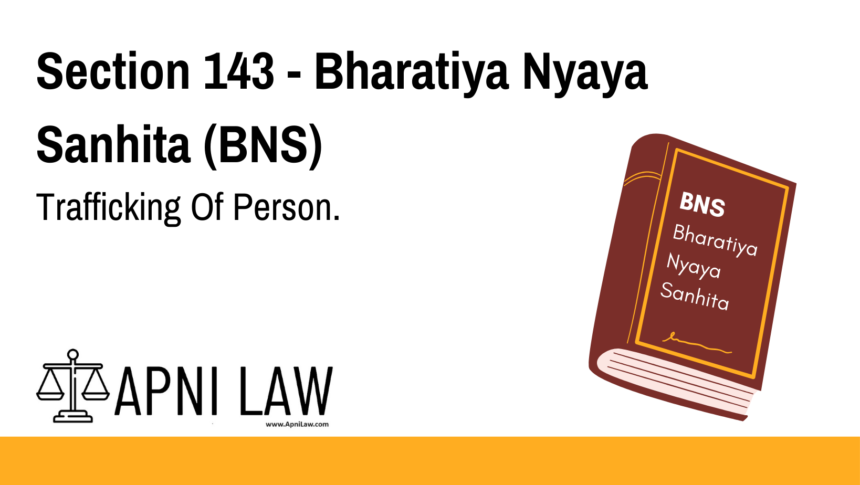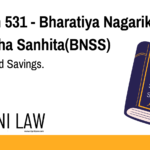Code
Section 143 – Bharatiya Nyaya Sanhita (BNS)
(1) Whoever, for the purpose of exploitation recruits, transports, harbours, transfers,
or receives a person or persons, by—
(a) using threats; or
(b) using force, or any other form of coercion; or
(c) by abduction; or
(d) by practising fraud, or deception; or
(e) by abuse of power; or
(f) by inducement, including the giving or receiving of payments or benefits, in
order to achieve the consent of any person having control over the person recruited,
transported, harboured, transferred or received, commits the offence of trafficking.
Explanation 1.—The expression “exploitation” shall include any act of physical
exploitation or any form of sexual exploitation, slavery or practices similar to slavery, servitude,
beggary or forced removal of organs.
Explanation 2.—The consent of the victim is immaterial in determination of the offence
of trafficking.
(2) Whoever commits the offence of trafficking shall be punished with rigorous
imprisonment for a term which shall not be less than seven years, but which may extend to
ten years, and shall also be liable to fine.
(3) Where the offence involves the trafficking of more than one person, it shall be
punishable with rigorous imprisonment for a term which shall not be less than ten years but
which may extend to imprisonment for life, and shall also be liable to fine.
(4) Where the offence involves the trafficking of a child, it shall be punishable with
rigorous imprisonment for a term which shall not be less than ten years, but which may
extend to imprisonment for life, and shall also be liable to fine.
(5) Where the offence involves the trafficking of more than one child, it shall be
punishable with rigorous imprisonment for a term which shall not be less than fourteen
years, but which may extend to imprisonment for life, and shall also be liable to fine.
(6) If a person is convicted of the offence of trafficking of a child on more than one
occasion, then such person shall be punished with imprisonment for life, which shall mean
imprisonment for the remainder of that person’s natural life, and shall also be liable to fine.
(7) When a public servant or a police officer is involved in the trafficking of any person
then, such public servant or police officer shall be punished with imprisonment for life, which
shall mean imprisonment for the remainder of that person’s natural life, and shall also be
liable to fine.
Explanation of Section 143 BNS
Section 143 of the Bharatiya Nyaya Sanhita (BNS), 2023, criminalizes trafficking of persons for exploitation. The law ensures strict punishment for offenders involved in recruiting, transporting, or harboring individuals through coercion, fraud, or abuse of power.
Key Elements of the Offense
- Acts Constituting Trafficking
- Recruiting, transporting, harboring, transferring, or receiving a person for exploitation.
- Means Used for Trafficking
- Threats, force, coercion, abduction, deception, abuse of power, or inducement (payments or benefits).
- Exploitation Definition
- Includes physical and sexual exploitation, slavery, servitude, beggary, and forced organ removal.
- Consent of the Victim is Irrelevant
- Even if a person agrees to be trafficked, it does not absolve the trafficker of liability.
Illustrations
Example 1: Forced Begging
A gang abducts young children and forces them to beg on the streets. Since the children are trafficked for exploitation, the traffickers will be punished under Section 143 BNS.
Example 2: Human Trafficking for Prostitution
A woman is lured with a job offer but is instead forced into prostitution. The traffickers will face rigorous imprisonment for a minimum of 7 years under Section 143 BNS.
Example 3: Organ Trafficking
A person is fraudulently taken to a hospital for surgery, where their organs are removed without consent. The perpetrators will be punished under this section with imprisonment and a fine.
Example 4: Police Involvement in Trafficking
If a police officer facilitates human trafficking, they will face imprisonment for the remainder of their natural life under Section 143(7) BNS.
Punishments Under Section 143 BNS
| Nature of Offense | Punishment |
|---|---|
| Trafficking of a person | 7 to 10 years + Fine |
| Trafficking of more than one person | 10 years to Life + Fine |
| Trafficking of a child | 10 years to Life + Fine |
| Trafficking of more than one child | 14 years to Life + Fine |
| Repeat offense of child trafficking | Life Imprisonment (for natural life) + Fine |
| Trafficking by a public servant/police | Life Imprisonment (for natural life) + Fine |
Common Questions and Answers on Section 143 BNS
1. What is the minimum punishment for trafficking under Section 143 BNS?
The minimum punishment is seven years of rigorous imprisonment and a fine.
2. What if the victim consents to trafficking?
The victim’s consent is immaterial under Explanation 2 of Section 143 BNS. Even if they agree, the offender is still guilty.
3. What happens if a trafficker is caught trafficking multiple children?
If more than one child is trafficked, the punishment increases to 14 years of rigorous imprisonment, which may extend to life imprisonment.
4. What if the trafficker is a government official or a police officer?
If a public servant or police officer is involved in human trafficking, they will receive life imprisonment for the remainder of their natural life along with a fine.
5. Can human trafficking cases be settled out of court?
No. Trafficking is a serious crime and cannot be settled between the parties. The law imposes strict punishment to prevent exploitation.
Conclusion
Section 143 BNS serves as a strong deterrent against human trafficking by ensuring strict penalties for offenders. The provision recognizes trafficking as a grave violation of human rights and ensures justice for victims.
For more legal insights and expert explanations on BNS sections, visit ApniLaw today! 🚀








